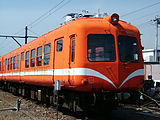Gakunan Railway
| Gakunan Railway Line | |||||||||||||||||||||||||||||||||||||||||||||||||||||||||||||||||||||||||||||||||||||||||||||||||||||||||||||||||||||
|---|---|---|---|---|---|---|---|---|---|---|---|---|---|---|---|---|---|---|---|---|---|---|---|---|---|---|---|---|---|---|---|---|---|---|---|---|---|---|---|---|---|---|---|---|---|---|---|---|---|---|---|---|---|---|---|---|---|---|---|---|---|---|---|---|---|---|---|---|---|---|---|---|---|---|---|---|---|---|---|---|---|---|---|---|---|---|---|---|---|---|---|---|---|---|---|---|---|---|---|---|---|---|---|---|---|---|---|---|---|---|---|---|---|---|---|---|---|
 A Gakunan train at Yoshiwara Station, November 2011 | |||||||||||||||||||||||||||||||||||||||||||||||||||||||||||||||||||||||||||||||||||||||||||||||||||||||||||||||||||||
| Overview | |||||||||||||||||||||||||||||||||||||||||||||||||||||||||||||||||||||||||||||||||||||||||||||||||||||||||||||||||||||
| Locale | Shizuoka Prefecture | ||||||||||||||||||||||||||||||||||||||||||||||||||||||||||||||||||||||||||||||||||||||||||||||||||||||||||||||||||||
| Termini | |||||||||||||||||||||||||||||||||||||||||||||||||||||||||||||||||||||||||||||||||||||||||||||||||||||||||||||||||||||
| Stations | 10 | ||||||||||||||||||||||||||||||||||||||||||||||||||||||||||||||||||||||||||||||||||||||||||||||||||||||||||||||||||||
| Website | https://www.gakutetsu.jp/ | ||||||||||||||||||||||||||||||||||||||||||||||||||||||||||||||||||||||||||||||||||||||||||||||||||||||||||||||||||||
| Service | |||||||||||||||||||||||||||||||||||||||||||||||||||||||||||||||||||||||||||||||||||||||||||||||||||||||||||||||||||||
| Type | Heavy rail | ||||||||||||||||||||||||||||||||||||||||||||||||||||||||||||||||||||||||||||||||||||||||||||||||||||||||||||||||||||
| Operator(s) | Gakunan Electric Train Co., Ltd. | ||||||||||||||||||||||||||||||||||||||||||||||||||||||||||||||||||||||||||||||||||||||||||||||||||||||||||||||||||||
| History | |||||||||||||||||||||||||||||||||||||||||||||||||||||||||||||||||||||||||||||||||||||||||||||||||||||||||||||||||||||
| Opened | 1936 | ||||||||||||||||||||||||||||||||||||||||||||||||||||||||||||||||||||||||||||||||||||||||||||||||||||||||||||||||||||
| Technical | |||||||||||||||||||||||||||||||||||||||||||||||||||||||||||||||||||||||||||||||||||||||||||||||||||||||||||||||||||||
| Line length | 9.2 km (5.7 mi) | ||||||||||||||||||||||||||||||||||||||||||||||||||||||||||||||||||||||||||||||||||||||||||||||||||||||||||||||||||||
| Track gauge | 1,067 mm (3 ft 6 in) | ||||||||||||||||||||||||||||||||||||||||||||||||||||||||||||||||||||||||||||||||||||||||||||||||||||||||||||||||||||
| Electrification | 1500 V DC overhead | ||||||||||||||||||||||||||||||||||||||||||||||||||||||||||||||||||||||||||||||||||||||||||||||||||||||||||||||||||||
| |||||||||||||||||||||||||||||||||||||||||||||||||||||||||||||||||||||||||||||||||||||||||||||||||||||||||||||||||||||
The Gakunan Railway Line (岳南電車岳南線, Gakunan Densha Gakunan-sen) is a Japanese railway line between Yoshiwara and Gakunan-Enoo, all within the industrial area of Fuji in Shizuoka Prefecture. The line does not have any official name.[citation needed] This is the only railway line Gakunan Electric Train Co., Ltd. (岳南電車株式会社, Gakunan Densha Kabushiki-gaisha) operates.[1] The operator company was established on April 1, 2013 as a subsidiary of the former operator Gakunan Railway (岳南鉄道, Gakunan Tetsudō), a subsidiary of Fuji Kyuko.[2][3]
Stations
| No. | Station | Japanese | Distance (km) |
Transfers | Location | |
|---|---|---|---|---|---|---|
| Between stations |
Total | |||||
| GD01 | Yoshiwara | 吉原 | – | 0.0 | Fuji, Shizuoka Prefecture | |
| GD02 | Jatco Mae | ジヤトコ前 | 2.3 | 2.3 | ||
| GD03 | Yoshiwara-honchō | 吉原本町 | 0.4 | 2.7 | ||
| GD04 | Hon-Yoshiwara | 本吉原 | 0.3 | 3.0 | ||
| GD05 | Gakunan-Harada | 岳南原田 | 1.4 | 4.4 | ||
| GD06 | Hina | 比奈 | 1.0 | 5.4 | ||
| GD07 | Gakunan-Fujioka | 岳南富士岡 | 1.0 | 6.4 | ||
| GD08 | Sudo | 須津 | 0.9 | 7.3 | ||
| GD09 | Kamiya | 神谷 | 0.9 | 8.2 | ||
| GD10 | Gakunan-Enoo | 岳南江尾 | 1.0 | 9.2 | ||
History
The Gakunan Railway began operations as an industrial railway named the Nissan Heavy Industrial Railroad (日産重工業専用鉄道, Nissan Jūkōgyō Senyō Tetsudō) on August 5, 1936 as part of a project to create an industrial center in Fuji city. The terminal station of the line was established at Yoshiwara Station on the Tokaido Main Line, and initial plans called for the line to be extended as far as Numazu Station. These plans were delayed by World War II and were eventually cancelled with the end of the war and breakup of the Nissan zaibatsu. The line gained its present name on December 15, 1948, after which regularly scheduled passenger service began. The electric supply for the line was upgraded from 600 Volts to the present 1,500 volts in 1969. In 1984, scheduled freight services past Sudo were discontinued.
All freight services were discontinued on March 16, 2012.[2]
Rolling stock
- 5000 series[4](Formerly Tokyu 5000 Series)
- 7000 series[5]
- 8000 series[5]
- 9000 series[5]
-
5000 series
-
7000 series
-
8000 series
-
9000 series
References
- ^ The Association of Japanese Private Railways. 民鉄各社紹介 岳南電車株式会社 [Introduction of private railway companies Daisen Train Co., Ltd.] (in Japanese). Retrieved June 15, 2013.
- ^ a b Gakunan Electric Train Co., Ltd. 会社概要 [Company Profile] (in Japanese). Retrieved June 15, 2013.
- ^ Fujikyuko Co., Ltd. 富士急グループ企業一覧 [List of Fujitsu Group companies] (in Japanese). Retrieved June 15, 2013.
- ^ "東急東横線90周年祝い、5050系に「青ガエル」ラッピング 9/4登場". tetsudo-ch.com (in Japanese). EXPRESS Co., Ltd. August 26, 2017. Archived from the original on July 27, 2019. Retrieved February 11, 2021.
- ^ a b c "車両紹介". gakutetsu.jp (in Japanese). Gakunan Electric Train. Archived from the original on October 19, 2020. Retrieved February 11, 2021.
External links
- Official website (in Japanese)



